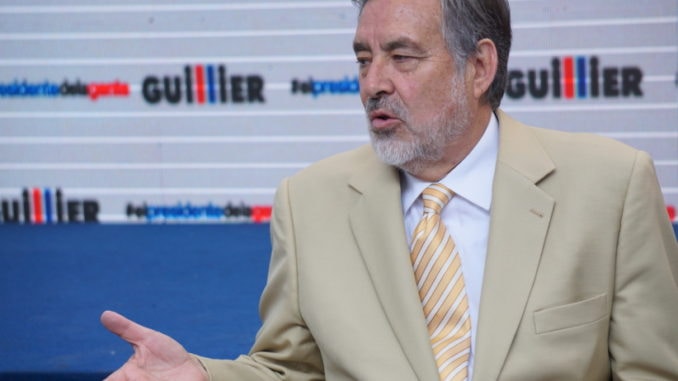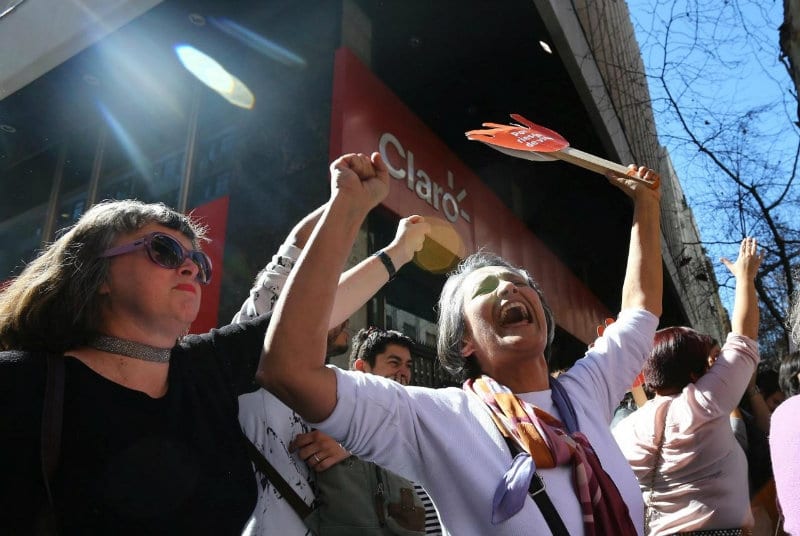
Boris Arjuna & Isabel Cocker/ Santiago Times Staff
With the presidential elections in Chile approaching, The Santiago Times introduces the candidates in a series of exclusive interviews. Today: Alejandro Guillier
Alejandro Guillier is the Left’s best chance of having another President in La Moneda, after the election in November and December. An independent candidate, but with the backing of six of the seven parties which make up the New Majority coalition, the senator for Antofagasta is currently second in the polls behind Sebastién Piñera.
 Guillier was primarily a journalist and a sociologist before becoming a politician, and was elected as the President of the Chilean College of Journalists in 2004. He has worked in radio and on television, and was a well-known public figure before his ascension into politics. Since becoming a senator, he has worked on the commissions for Energy and Mining, and Defence and Ethics. His campaign manifesto highlights a belief in a government which should work for the people, though an emphasis on citizen-led policy. Because of this, his campaign slogan is “El Presidente de la gente” (The People’s President).
Guillier was primarily a journalist and a sociologist before becoming a politician, and was elected as the President of the Chilean College of Journalists in 2004. He has worked in radio and on television, and was a well-known public figure before his ascension into politics. Since becoming a senator, he has worked on the commissions for Energy and Mining, and Defence and Ethics. His campaign manifesto highlights a belief in a government which should work for the people, though an emphasis on citizen-led policy. Because of this, his campaign slogan is “El Presidente de la gente” (The People’s President).
The Santiago Times sat down with Guillier for an exclusive interview which explores his policies and personal views on a wide variety of topics, from abortion and the rights of homosexual couples, to foreign and economic policy.
 Principally, he shows a concern for a democracy which should work from the people, and for the people. He refers to the September 11th 1973 coup as a “brutal tragedy” but one which “has taught us to value our democracy much more and to value the constitutional mechanisms of peaceful governance.” His views show a preoccupation for the rights and livelihoods of the lower and middle classes, and especially for those who have traditionally been excluded from the political conversation. When asked whether homosexual couples should have the right to adopt a child, his answer is short and categoric: “Where there is a couple, there is love, and that means there is a family”.
Principally, he shows a concern for a democracy which should work from the people, and for the people. He refers to the September 11th 1973 coup as a “brutal tragedy” but one which “has taught us to value our democracy much more and to value the constitutional mechanisms of peaceful governance.” His views show a preoccupation for the rights and livelihoods of the lower and middle classes, and especially for those who have traditionally been excluded from the political conversation. When asked whether homosexual couples should have the right to adopt a child, his answer is short and categoric: “Where there is a couple, there is love, and that means there is a family”.
He elaborates more when it comes to the issue of the Mapuche people in the Araucanía, highlighting the history of the territory and the presence of the indigenous communities in the South before the Spanish invasion and colonisation. He underlines that “it is not only about land, but also the possibility of survival in a world where possession has reached a limit, a very narrow border, and their way of life is absolutely threatened. Therefore, this requires a very creative solution.” He talks about protection and empowerment, making an effort to ensure that the Mapuche have a voice in government so that they may represent themselves.
 “We have to resolve the historic problem which our government has had in constitutionally recognising the original peoples. Not only formal recognition but also real recognition, objective recognition of their language, culture, customs, rights, authority, and in that way even the devolution of heritage which has been taken from them.”
“We have to resolve the historic problem which our government has had in constitutionally recognising the original peoples. Not only formal recognition but also real recognition, objective recognition of their language, culture, customs, rights, authority, and in that way even the devolution of heritage which has been taken from them.”
He disagrees with the implementation of the Anti-Terrorism law to combat what some people see as “the Mapuche problem”, stating that “there are no more than 150 people involved in these acts of violence, and not all are Mapuche. There are Mapuche, but not all are. And, additionally, using certain links with the community, these people are more outside of the community than involved in it. Therefore, it is a serious error to use the military for 150 people.”
The common thread of changing policy to a more publicly-minded form of governance is one which runs through many of his responses. Although he admits that immigration can be seen as an “illegal competition” and a “cause of friction” for many Chilean workers, who have seen the average wages bought down in some manual sectors with the influx of foreign labourers, he is quick to point out that it is not the fault of the immigrant. “The problem is not the immigrant; the problem is the absence of our public policy which doesn’t allow for a reasonable integration into Chilean society … the problem lies with our own policies”.
 However, he is less liberal when it comes to the rights of women. Although he agrees with abortion in certain circumstances, he believes that the recently-passed law, which allowed for abortion only when either the mother or the foetus is at risk, or if the pregnancy was the result of a sexual assault, is sufficient. “Of course, you can understand and have compassion for those women or couples who find themselves in this situation and take the option, but it is not our policy to promote abortion”, he stated.
However, he is less liberal when it comes to the rights of women. Although he agrees with abortion in certain circumstances, he believes that the recently-passed law, which allowed for abortion only when either the mother or the foetus is at risk, or if the pregnancy was the result of a sexual assault, is sufficient. “Of course, you can understand and have compassion for those women or couples who find themselves in this situation and take the option, but it is not our policy to promote abortion”, he stated.
He instead suggests a need for a national conversation, declaring that “the theme of sexual education is something that no one talks about frankly, it doesn’t come up in schools, nor in families, nor anywhere because the conservative sectors have blocked any attempt at addressing it. Conversations in school, at home, at church should be normalised.”
He subtly attacks these conservative sectors throughout the interview, highlighting when talking on the theme of corruption the difference between “our world, the world of the centre-left, ethics are a really demanding factor”, and the capitalist Right. He suggests that “things which in other countries would be a crime, here don’t even cause a scandal”. However, he implies that the strong ethics of the left prevents them from succeeding as strongly in the business sector, which leads the public to see them as “weaker” than the Right. “Of course, Piñera doesn’t do anything which others don’t do”, he quips.
The current class-bound system of Chilean society is one which preoccupies Guillier, who announces that “it’s difficult to ascend because in Chile, segregation begins at school.” For him, this segregation is built around the social networks which people build through their school and university years, which prevents anyone not part of “the elite” from accessing top jobs and positions in prominent companies. “It has been demonstrated that the links which have been formed in the middle class, they determine the composition of the big businesses. There are so many relations, people who are linked either through family or friendship, and therefore it [recruitment] isn’t a process which looks for excellence or achievement.”
 It has been a system which, in his opinion, has only been strengthened further by previous government actions aimed at solving the problem. Although he is asked whether he believes all students should have free access to a university education, he does not give a straight answer. Instead, he highlights the now-obsolete FDI system: “We even had something which we called the indirect financial aid, the FDI, which was a prize given by the state to the highest achieving pupils. But we have had to reform this, because it has been proved that the majority of those with the highest achievement come from these “elite” schools, and therefore instead of levelling the playing field, what was actually happening was a concentration of money in those universities where these people studied.”
It has been a system which, in his opinion, has only been strengthened further by previous government actions aimed at solving the problem. Although he is asked whether he believes all students should have free access to a university education, he does not give a straight answer. Instead, he highlights the now-obsolete FDI system: “We even had something which we called the indirect financial aid, the FDI, which was a prize given by the state to the highest achieving pupils. But we have had to reform this, because it has been proved that the majority of those with the highest achievement come from these “elite” schools, and therefore instead of levelling the playing field, what was actually happening was a concentration of money in those universities where these people studied.”
Nevertheless, he believes that when it comes to money and the economy, the government should concentrate on making a sustainable effort to support the smaller businesses which are making inroads in a country whose primary trade has always been in the export of raw materials through mining. “Chile has to find new motors for its economy and for this, renewable energy is performing strongly, as is the digitalization of the country, the areas around the borders of the country, with natural tourism also opening up big markets in things such as healthy foods, things that are not necessarily a “brand”. And this can be achieved with policies concentrating on the development of small businesses: in natural tourism, 95% of all the businesses are pimes … what we call small- or medium-sized companies,” he states.
 Guillier believes that citizens should play an active role in forming government policy, and this overlaps in his foreign policy where he states that Chile, as a citizen of the world, should work much more closely with the international community to present a united front. “For Latin America, we need to have a common voice and have the mechanisms to solve the conflicts in our own countries without the interference of anyone outside our continent”, he states, using the historical example of the United States’ interference in the continent as an argument for the autonomy of the region. He thinks that Chile should not take an active part in any conflict which may occur in Venezuela, but instead that “it should be part of the solution. And it should act in coordination with the other countries in Latin America.”
Guillier believes that citizens should play an active role in forming government policy, and this overlaps in his foreign policy where he states that Chile, as a citizen of the world, should work much more closely with the international community to present a united front. “For Latin America, we need to have a common voice and have the mechanisms to solve the conflicts in our own countries without the interference of anyone outside our continent”, he states, using the historical example of the United States’ interference in the continent as an argument for the autonomy of the region. He thinks that Chile should not take an active part in any conflict which may occur in Venezuela, but instead that “it should be part of the solution. And it should act in coordination with the other countries in Latin America.”
This international coordination is a strategy which he returns to when discussing the current international problems with North Korea. According to Guillier, “It wouldn’t make sense for Chile to do something individually, to break [trade relations] individually, does it? Chile is fairly irrelevant to them, to be honest.” However, he acknowledges the need to act in accordance with the United Nations, and underlines that as President “I would act from the common position of the United Nations and the common position of the American, or Latin American, community, and we would make this decision together.”



